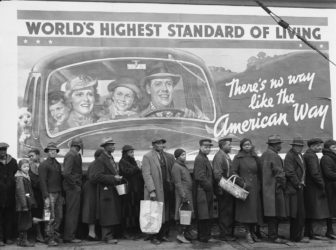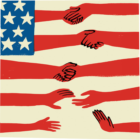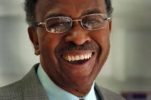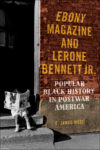 Featured – Straggling in a Good Economy, and Now Struggling in a Crisis. By Patricia Cohen / NYT
Featured – Straggling in a Good Economy, and Now Struggling in a Crisis. By Patricia Cohen / NYT
An indelible image from the Great Depression features a well-dressed white family seated with their dog in a comfy car, smiling down from an oversize billboard on weary black souls standing in line at a relief agency. “World’s highest standard of living,” the billboard boasts, followed by a tagline: “There’s no way like the American Way.” In the updated 2020 version, lines of cars stretch for miles to pick up groceries from a food pantry; jobless workers spend days trying to file for unemployment benefits; renters and homeowners plead with landlords and mortgage bankers for extensions; and outside hospitals, ill patients line up overnight to wait for virus testing. Read more
Also see, ‘Woe Is You,’ White People Keep Telling Us. By Jeremiah Bey Ellison / NYT
And see, The Stimulus Isn’t Enough. By Emily Peck / HuffPost
 How the rich reacted to the bubonic plague has eerie similarities to today’s pandemic. By Kathryn McKinley / The Conversation
How the rich reacted to the bubonic plague has eerie similarities to today’s pandemic. By Kathryn McKinley / The Conversation
The coronavirus can infect anyone, but recent reporting has shown your socioeconomic status can play a big role, with a combination of job security, access to health care and mobility widening the gap in infection and mortality rates between rich and poor. The wealthy work remotely and flee to resorts or pastoral second homes, while the urban poor are packed into small apartments and compelled to keep showing up to work. As a medievalist, I’ve seen a version of this story before. Read more
 Black-White Divide Grows Starker As More Coronavirus Data Emerges. By Kat Stafford, Meghan Hoyer and Aaron Morrison / HuffPost
Black-White Divide Grows Starker As More Coronavirus Data Emerges. By Kat Stafford, Meghan Hoyer and Aaron Morrison / HuffPost
As a clearer picture emerges of COVID-19’s decidedly deadly toll on black Americans, leaders are demanding a reckoning of the systemic policies they say have made many African Americans far more vulnerable to the virus, including inequity in access to health care and economic opportunity. Read more
 Who will Trump sacrifice to “reopen America”? That means black bodies. By Sophia Tesfaye / Salon
Who will Trump sacrifice to “reopen America”? That means black bodies. By Sophia Tesfaye / Salon
There is still so much about the coronavirus that we do not know. But one thing we know with saddening certainty — that black communities are disproportionately more likely to die from COVID-19 — seems yet to have received proper credence from those shouting to quickly “reopen America,” or from the elected officials tasked with ensuring safe and secure elections. While neither the virus nor the several state-mandated lockdowns ordered to stop its deadly spread discriminate, it’s time to get specific about just who exactly is being asked to sacrifice their lives and livelihood in our rush to return to normal. Read more
 As more black Americans die from coronavirus, community leaders are taking action. By Janell Ross / NBC News
As more black Americans die from coronavirus, community leaders are taking action. By Janell Ross / NBC News
“The numbers are really only a concrete indictment of the leadership of the federal government, the leadership of Donald Trump and the lack of preventative care that African Americans have at all times in this country,” McBride said. “What we are going to do is leverage the existing infrastructure of black religious communities and existing anti-gun violence networks to help the the places and people who need it most. If we don’t, who will?” Read more
Also see, Doctors Bring Coronavirus Testing To Underserved Communities. By Leila Fadel / NPR
 Black scientists hope to begin testing antiviral drug for coronavirus in two weeks. By Curtis Bunn / NBC News
Black scientists hope to begin testing antiviral drug for coronavirus in two weeks. By Curtis Bunn / NBC News
Meharry Medical College was founded in 1876 in Nashville, Tennessee, to teach medicine to former enslaved Africans and to serve the underserved. Now, in one of its laboratories, Dr. Donald Alcindor says he is two weeks away from testing an anti-virus to prevent COVID-19, the disease ravaging many African American communities across the country. Read more
 Trump and His Allies Are Worried About More Than November. By Jamelle Bouie / NYT
Trump and His Allies Are Worried About More Than November. By Jamelle Bouie / NYT
No doubt there is real concern for the economic and health consequences of an extended shutdown. But Republicans, and Trump in particular, are also thinking about November. If the president knows anything, it’s that his fate rises and falls with the state of the economy. But I think there’s another element underlying the push to reopen the economy despite the threat it poses to American lives. Read more
 Breaking the Grip of White Grievance. By John A. Farrell / The New Republic
Breaking the Grip of White Grievance. By John A. Farrell / The New Republic
With Biden’s success in the primaries, lines are drawn. The presidential election will likely pit the Democratic herald of a younger, more tolerant, multiracial America against a Republican tribune of white fear and grievance. The outcome is uncertain. Both sides are seething. Read more
 The Coronavirus Is Changing How Americans View One Another. By Alexander W. Cappelen, Ranveig Falch, Erik O. Sorensen, Bertil Tungodden and
The Coronavirus Is Changing How Americans View One Another. By Alexander W. Cappelen, Ranveig Falch, Erik O. Sorensen, Bertil Tungodden and
 COVID-19 Protesters Just Like Rosa Parks, Says White House Adviser Stephen Moore. By Mary Papenfuss / HuffPost
COVID-19 Protesters Just Like Rosa Parks, Says White House Adviser Stephen Moore. By Mary Papenfuss / HuffPost
The largely white protesters who oppose social distancing measures to protect the public from COVID-19 are like Rosa Parks, who waged a historic battle for racial equality, right-wing economic commentator and White House adviser Stephen Moore repeatedly insisted Friday. Read more
Also see, Protests are popping up across the US over stay-at-home restrictions. By Dakin Andone / CNN
 Tucker Carlson: “Radical expansion” of voting by mail championed by Obama would “destroy” democracy. By Matthew Rozsa / Salon
Tucker Carlson: “Radical expansion” of voting by mail championed by Obama would “destroy” democracy. By Matthew Rozsa / Salon
Fox News host Tucker Carlson claimed Tuesday that former first lady Michelle Obama’s support for mail-in voting could “destroy” American democracy. Obama and When We All Vote, the non-partisan voter registration organization she co-chairs, released a statement Monday arguing that “Americans should never have to choose between making their voices heard and keeping themselves and their families safe. Expanding access to vote-by-mail, online voter registration and early voting are critical steps for this moment — and they’re long overdue.” Read more
 Covid-19 took Flint’s first black superintendent, whose work empowered minority students. By Michael Brice-Saddler / Wash Post
Covid-19 took Flint’s first black superintendent, whose work empowered minority students. By Michael Brice-Saddler / Wash Post
Burtley served as deputy superintendent of Flint Community Schools in 1981 and went on to lead the entire system seven years later. News articles at the time illustrated his passion and focus on community education — namely, to pair minority students with role models and teachers who looked like them. Following retirement in 1994, he became assistant athletic director at Michigan State University before returning to Flint as principal of a K-8 school. Read more
 Bubba Wallace, NASCAR’s only African American driver, talks to Kyle Larson about racial slur. By Michael Errigo / Wash Post
Bubba Wallace, NASCAR’s only African American driver, talks to Kyle Larson about racial slur. By Michael Errigo / Wash Post
In a lengthy statement posted to Twitter on Thursday, Bubba Wallace, the only African American driver in the NASCAR Cup Series, weighed in on the hottest topic in his sport this week — fellow driver Kyle Larson’s use of a racial slur and the resulting fallout. Read more
 Michael Jordan’s furious desire to conquer all still burns decades later. By Aaron Timms / The Guardian
Michael Jordan’s furious desire to conquer all still burns decades later. By Aaron Timms / The Guardian
A superb new ESPN documentary series reminds us that everything in the NBA legend’s playing career was bent towards a single goal: winning. The Last Dance, the 10-part documentary whose first episodes premiere on ESPN in the US on Sunday (with the worldwide releases for each on Netflix the following day), shows, he was so much more. Read more
 Ebony Magazine and Lerone Bennett Jr.: A New Book on Popular Black History in Postwar America. By AAIHS Editors
Ebony Magazine and Lerone Bennett Jr.: A New Book on Popular Black History in Postwar America. By AAIHS Editors
From its launch in 1945, Ebony magazine was politically and socially influential. However, the magazine also played an important role in educating millions of African Americans about their past. Guided by the pen of Lerone Bennett Jr., the magazine’s senior editor and in-house historian, Ebony became a key voice in the popular Black history revival that flourished after World War II. E. James West’s fresh and fascinating exploration of Ebony‘s political, social, and historical content illuminates the intellectual role of the iconic magazine and its contribution to African American scholarship. Read more
Visit our home page for more articles, book/podcast and video favorites. And at the top of this page register your email to receive notification of new editions of Race Inquiry Digest. Click here for earlier Digests.
Use the buttons below to share the Digest in an email, or post to your Facebook, Linkedin or Twitter accounts.